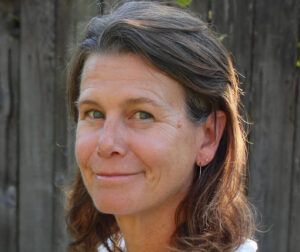
Adrienne Russell, Mary Laird Wood Professor of Communication, returned to Seattle inspired after a globe-trotting research sabbatical in 2023-24. That Fall, Russell visited Waseda University in Tokyo as a fellow at the Society for the Promotion of Science, and she conducted research and gave talks in Chile before participating in a second fellowship at the Weizenbaum Institute in Berlin. These research and collaboration trips contributed to Russell’s work on a new book in progress focused on how to make digital innovation more compatible with environmental and social sustainability. Russell’s most recent book is The Mediated Climate: How Journalists, Big Tech, and Activists are Vying for our Future (Columbia University Press, 2023) which explores the roles journalism, activism, corporations, and Big Tech play in the climate and information crises.
This year, Russell is participating in two UW initiatives, working with scholars from across UW’s campuses. The first, the Climate Impact Group, aims to build climate resilience by advancing science-based action to identify and manage environmental risks. The second, UW’s Civic Health Initiative, is working to strengthen civic participation and confidence in the public institutions that serve us, by creating a more connected, effective society where people can work together to tackle big challenges and build a healthier democracy. Russell says this work sustains her both professionally and personally. “I’m inspired by working with people across campus and around the world who are committed to addressing problems like the climate crisis, challenges to democracy, in particular the rise of authoritarianism,” she says. “And the fact that my research on the social and environmental impacts of Big Tech is so relevant to what is going on in the US government right now makes the work seem especially worth doing.”
This same enthusiasm fuels Russell’s teaching. Spring quarter she co-taught “Communication Design and the Environment” with Design Professor Dominic Muren while also leading climate justice conversations in her undergraduate course, “Communication and the Environment.”
Together with Professor Matt Powers, Russell also co-directs the Center for Journalism, Media, and Democracy (CJMD). The Center’s mission is to investigate the features of the media landscape―its tools, platforms, policies, practices―to understand how they can both support and threaten democracy. Russell and her CJMD colleagues do this through teaching, research, and public outreach. “Journalism is meant to keep power in check…there’s so much encouragement to fit into the system, even if it’s broken, because we don’t have alternatives. It’s my job to point to these alternatives, to highlight the work that people are doing that’s truly innovative.”
The CJMD regularly offers programming for the broader public and alumni on some of our most pressing contemporary issues. The Center recently co-hosted a Technology for the People event with Society + Technology for a roundtable discussion on how to make tech work for, not against people. Powers, Professor Patricia Moy, and some of the center’s graduate students recently released a report on the state of statehouse journalism in Washington. The report provides meaningful insights into the shifting coverage of the state legislature.
This June, Russell moderated the CJMD event “Public Media Under Pressure: Why it Matters and What Can be Done,” a roundtable discussion featuring the leaders of Seattle’s public media outlets—Cascade PBS, KNKX, and KUOW about the current challenges the industry faces, such as federal funding cuts, and will explore paths for sustaining public service journalism. (Follow this link to view the discussion on our YouTube page, and follow us on LinkedIn for announcements about future public events.).
For Russell, the continued success of UW Communication lies in the cross-pollination of ideas and action across communities, disciplines, and generations. “It’s important for scholars to have conversations with the larger community. Our students are energized by the work of our alumni—whether they graduated five or 40 years ago. This department is a base, and it’s such a good base to think, engage, and respond to the needs of the day.”
In this moment, when higher education, journalism, the climate, and democracy are facing unprecedented challenges, Russell’s work is a reminder that we can all take action in ways big and small. “Everybody should leverage the power that they have in whatever realm, to do what they can about what they care about,” she says.
To learn more about CJMD programs, visit cjmd.com.uw.edu.
To make a gift to the CJMD, please follow this link to the “Friends of the Center for Journalism, Media and Democracy” giving portal.
